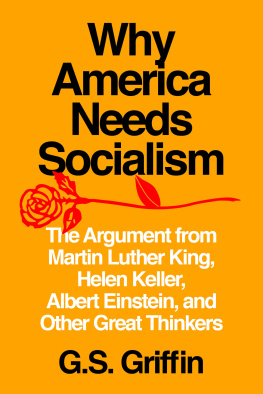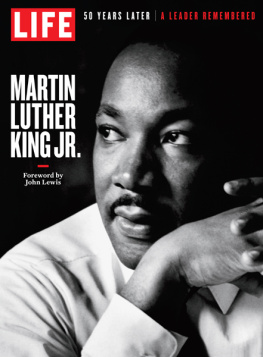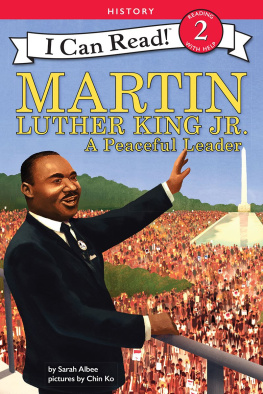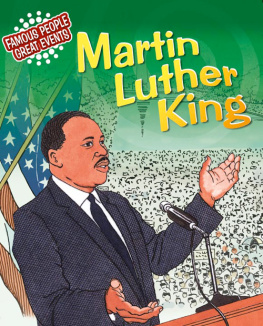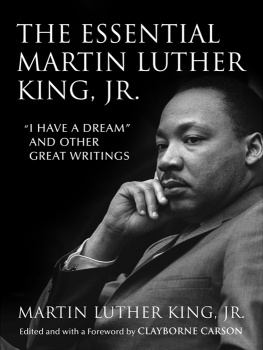
WHY AMERICA NEEDS SOCIALISM
The Argument from Martin Luther King, Helen Keller, Albert Einstein, and Other Great Thinkers
G.S. Griffin

Copyright 2019 by G.S. Griffin
All rights reserved.
No part of this book may be used or reproduced in any manner without written permission of the publisher. Please direct inquires to:
Ig Publishing
Box 2547
New York, NY 10163
www.igpub.com
ISBN: 978-1-63246-102-5 (ebook)
For Jeff,
friend on the Right
I find Im a good deal more of a socialist than I thought
Walt Whitman
Horace Traubel, With Walt Whitman in Camden, vol. 2, p. 4
CONTENTS
INTRODUCTION
CONSIDER THE WORDS THAT A SHORT African American minister with a black mustache penned while sitting in a Selma, Alabama, jail cell in 1965, having just been arrested during a voting rights demonstration: If we are to achieve a real equality, the US will have to adopt a modified form of socialism.
The minister, Dr. Martin Luther King, Jr., was not just a brilliant orator and champion of civil rights. He was also anti-war, anticapitalism, and pro-socialism. He saw capitalism as exploitive by nature, an economic structure that bred poverty, injustice, and death. Dr. King studied Karl Marxs works, wrote of Marxism in essays like How Should a Christian View Communism? and My Pilgrimage to Nonviolence, and was inspired by socialists like Mahatma Gandhi and W.E.B. du Bois.
When I discovered that Dr. King was a socialist, I wondered if it was possible to build a case for socialism in America today based on his writings and those of other famous radical historical figures. This book is the answer to that question. In these pages, you will find many well-known thinkers, writers, and artists, from around the world, who believed that socialism could help end poverty, exploitation, authoritarianism, war, and even some forms of bigotry (even if some of the individuals herein were quite bigoted and otherwise seriously flawed). I think its safe to say youre in for a few surprises.
In order to determine who to include, I had to first figure out who was known well enough to be featured. Would the average reader immediately recognize the names George Bernard Shaw, Sinclair Lewis, Dorothy Day, Paul Robeson, Pete Seeger, Ella Baker, Elizabeth Gurley Flynn, or Dalton Trumbo? Its rather subjective. So, I focused on those whom most people would probably know, especially readers who were not already socialists.
Second, while this too is subjective and there are a few exceptions in the text, it was important to exclude figures mainly known for their radicalism. This isnt a book featuring Karl Marx, let alone less commonly known radicals like Friedrich Engels, Rosa Luxemburg, Emma Goldman, Fred Hampton, Bobby Seale, Huey Newton, Eugene Debs, Bertrand Russell, or Jean-Paul Sartre. This likewise excluded modern anti-capitalist figures like Barbara Ehrenreich, Noam Chomsky, Gloria Steinem, Cornel West, Alexandria Ocasio-Cortez, and Bernie Sanders.
I also sought to avoid interpretation, lifting up the voices of those who flatly stated the flaws of capitalism or benefits of socialism, rather than arguing whether Herman Melvilles Moby Dick and Bartleby, the Scrivener are critiques of capitalism. Also, those who were very private about their views and thus did not write or speak much on the subject, or merely had some socialist or anti-capitalist sympathies, were also largely excludedpeople like Ernest Hemingway, Charlie Chaplin, Nina Simone, Susan B. Anthony, and Cesar Chavez.
Finally, someone could have been left out in error. This of course haunts me, particularly where the women of history are concerned. The book is male-centric, which may be a testament to how patriarchal societies held countless women back from great renown and accomplishment. It may also be that anti-capitalist views were more likely to hurt the success of women than that of men, causing the former to be less recognized for their radicalism. The same is likely true for radicals of color as well.
The people in this book did not all perfectly agree on what socialism should be, nor how it should come about (they werent all specifically thinking of America when voicing the necessity of socialism, either). Some are in fact better called communists or anarchists, and I try to differentiate between these philosophies and socialism while at the same time finding common ground. My view is simply that all the thinkers included in this book in their own unique ways envisioned a better, socialistic world, and that the modern case for socialism in America can be justified and supported using their beliefs. Ultimately, they are here to help us, to serve as reasoning, free-thinking guidesas they always have, now just in a new way.
PART ONE
CAPITALISM
One
HUMAN NATURE
IN 1950, ALBERT EINSTEIN PENNED AN essay entitled Why Socialism? In it, he wrote, I am convinced that there is only one way to eliminate these grave [capitalistic] evils, namely through the establishment of a socialist economy.
Importantly, Einstein addressed the common criticism that socialism is incompatible with human nature, that greed, individualism, and competitiveness are the dominant traits of our species, thus explaining why capitalism exists and why socialism cannot succeed. In this thinking, anything venturing into the realm of cooperation, generosity, and solidarity simply isnt feasible. Indeed, Einstein wrote that we have a biological constitution which we must consider fixed and unalterable, including the natural urges which are characteristic of the human species.
It is true we humans evolved to be capable of some very dark things. For example, our nature grew to include the ability to kill and steal, fueled by selfishness, in order to survive. Those entirely incapable of such things were less likely to survive and reproduce, and their genes disappeared with them, per natural selection. Many readers of faith believe that higher powers created humanity to be sinful by nature. Thus, it makes sense to many that capitalism is natural, and the way things must remain.
Capitalism is an economic system characterized by the private ownership of business and industry, where earning a profit by selling a good or service is each owners basic and necessary goal. Under this system, private firms compete to seize a larger and larger share of a given market, to scale and meet (and, in the modern world of advertising, create) the demands of the greatest possible number of consumers, the ultimate success being to control the market at the expense of other businesses. The capitalist, the owner, can take an even greater piece of the market with each competitor that goes under, which leads to more consumers, and thus more profits. Profits not only enrich the capitalist (and company shareholders) personally, they also allow the business to expand into markets in other neighborhoods, cities, or countries. Profits also provide opportunities for investment in new technologies that reduce the cost of production, the number of hours needed to create each commodity, and the number of workers the capitalist needs to create each commodity, leading to even more profits.
Next page
